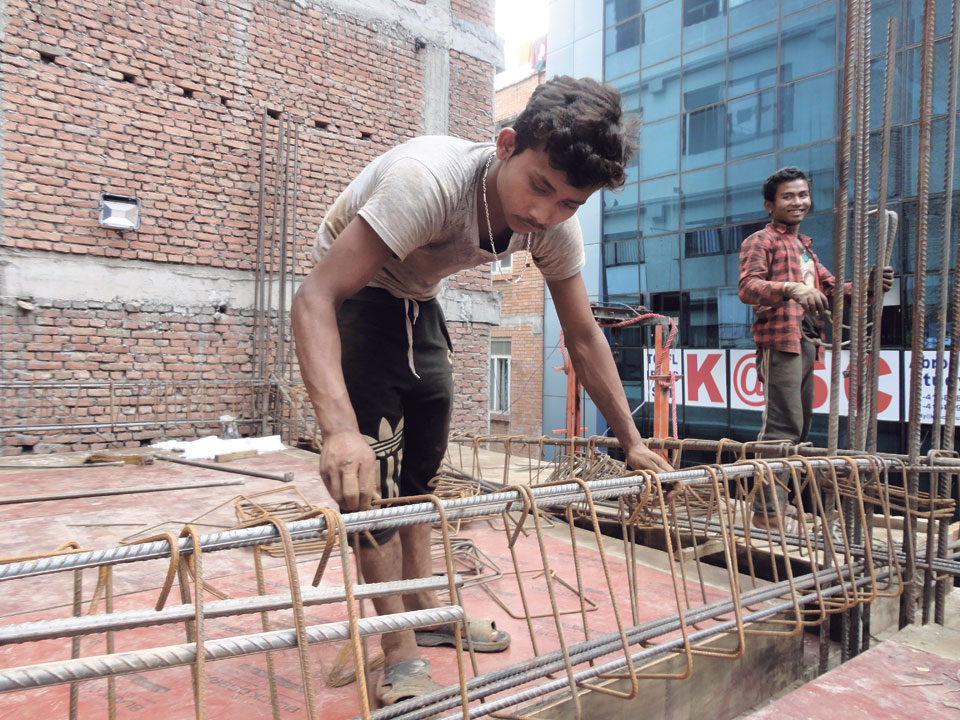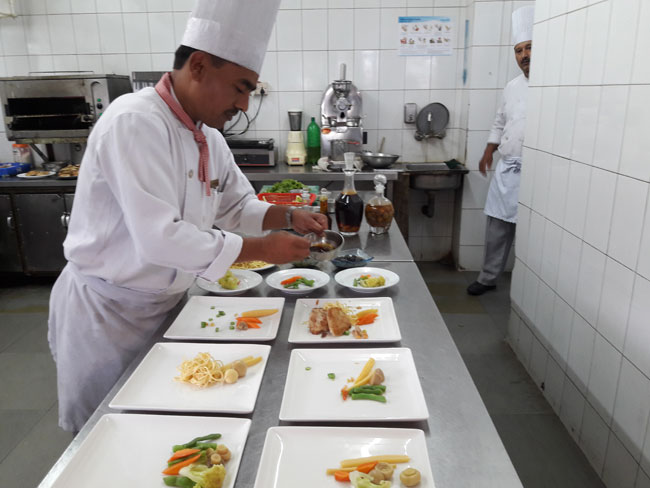
OR
Informally acquired skills to get globally accepted certification
Published On: July 25, 2017 07:00 AM NPT By: Rudra Pangeni | @rudrapang

KATHMANDU, July 24: Mukesh Chaudhary took a break from his work in Kathmandu in June and went his hometown to sit in final examinations of Grade 12. Chaudhary, 21, works at a construction site and earns to help his parents. Chaudhary has already earned skills in construction work which he neither studied nor attended any training. Now, he is working as a foreman or sub-overseer (fourth level manpower by global standard) in the booming construction industry in Kathmandu.
Chaudhary, who started as helper in the construction industry, has already climbed two ranks -- helper and mason -- in his job ladder in the past two and half years. He supervises seven workers at his present construction site. None of them has received any formal training.
The young foreman says he managed to learn the techniques of engineering quickly, thanks to exposure to working style of engineers. "I want to learn fitting structures like the way graduate engineers do by reading structure designs," Chaudhary said.
Chaudhary earns Rs 1,200 for eight-hour work and finances for his sister's nursing education. The daily wage earner, however, is not happy with his earning and wants to have a decent job and get regular salary. "But I have no idea how to land a job that pays me regularly. Maybe I will go to Malaysia or Qatar as my father wants me to do," said Chaudhary.
Chaudhary has no skill certificate.
Unlike Chaudhary, Keshav Kunwar, who is a Chef De Party (5th level in global standard), is a regular jobholder at Lalitpur-based Himalayan Hotel. Like Chaudhary, he also does not have any certification of his skills and knowledge. Kunwar, who started as a sweeper in 1994, has skills and expertise in kitchen planning, hygiene, safety and menu planning, among others. But he does not have certificates of his skills. “Lack of certification of my skill is preventing me to switch to other hotel or bargain with my existing employer for higher pay,” added Kunwar.

Expecting better pay, Kunwar had applied at Gokarna Forest Resort in 2014 for the post of Demi Chef De Party. But he was not hired for he did not have academic degree in hotel management. Later, he tried to get admission in a hotel management college. But the college turned down his application, stating that he already has higher level of skills. “Had I got any certification of my skills, I would have earned at least 25 percent more,” Kunwar lamented.
Boom in construction and hospitality sector has created high demand for skilled workforce like Chaudhary and Kunwar. But people, who acquired skills by learning by doing like Chaudhary and Kunwar, are not getting any opportunity in the lack of their skill certification. Skill certification based on competency level can help a lot of youths flying abroad who neither have academic degrees nor skills certification.
National Skill Testing Board (NSTB), a government's skill testing agency, currently assesses skills acquired informally and awards certificates through skill testing exams only up to Level 4. However, preparations are underway to expand this skill testing system as the government is now devising National Vocational Qualifications Framework which will award workforce of the construction and hospitality sector in the beginning with globally accepted certificates from Level 1 to 8. Level 5 is equivalent to Bachelor's degree, while Level 8 is equivalent to PhD degree.
"We have a pan to test the level of skills and competency acquired informally and award recognition (certificate). It will bridge informal knowledge and skills with formal one," Hari Lamsal, joint secretary of the Ministry of Education, told Republica. He further added that it would take some more months to endorse the framework document.
According to the plan, NSTB will be transformed into National Vocational Qualifications Authority which will gradually add other type of skills like mechanics, beauticians, mobile mechanics and electricians etc in its testing system. This plan is a pilot project started in cooperation with Swiss Agency for Development and Cooperation in 2014.
Over 500,000 youths enters into the job market every year, according to the economic survey of 2017.
You May Like This

Winner of ‘Get Smart Get Republica’ receives aprilla 150 SR
KATHMANDU, Nov 15: Nepal Republic Media has handed over aprilla 150 SR scooter to the winner of last month ‘Get... Read More...

‘Get Smart Get Republica’ lucky draw winner announced
KATHMANDU, Nov 9: Nepal Republic Media has announced ‘Get Smart Get Republica’ lucky draw winner among the subscribers of last... Read More...

Panchakanya CPVC pipes get ISI certification
KATHMANDU, June 9: Panchakanya Chlorinated Polyvinyl Chloride (CPVC) pipes and fittings has received ISI certification from India's quality certification agency. Read More...




Just In
- Gandaki Province CM assigns ministerial portfolios to Hari Bahadur Chuman and Deepak Manange
- 352 climbers obtain permits to ascend Mount Everest this season
- 16 candidates shortlisted for CEO position at Nepal Tourism Board
- WB to take financial management lead for proposed Upper Arun Project
- Power supply to be affected in parts of Kathmandu Valley today as NEA expedites repair works
- Godepani welcomes over 31,000 foreign tourists in a year
- Private sector leads hydropower generation over government
- Weather expected to be mainly fair in most parts of the country today







_20220508065243.jpg)







Leave A Comment